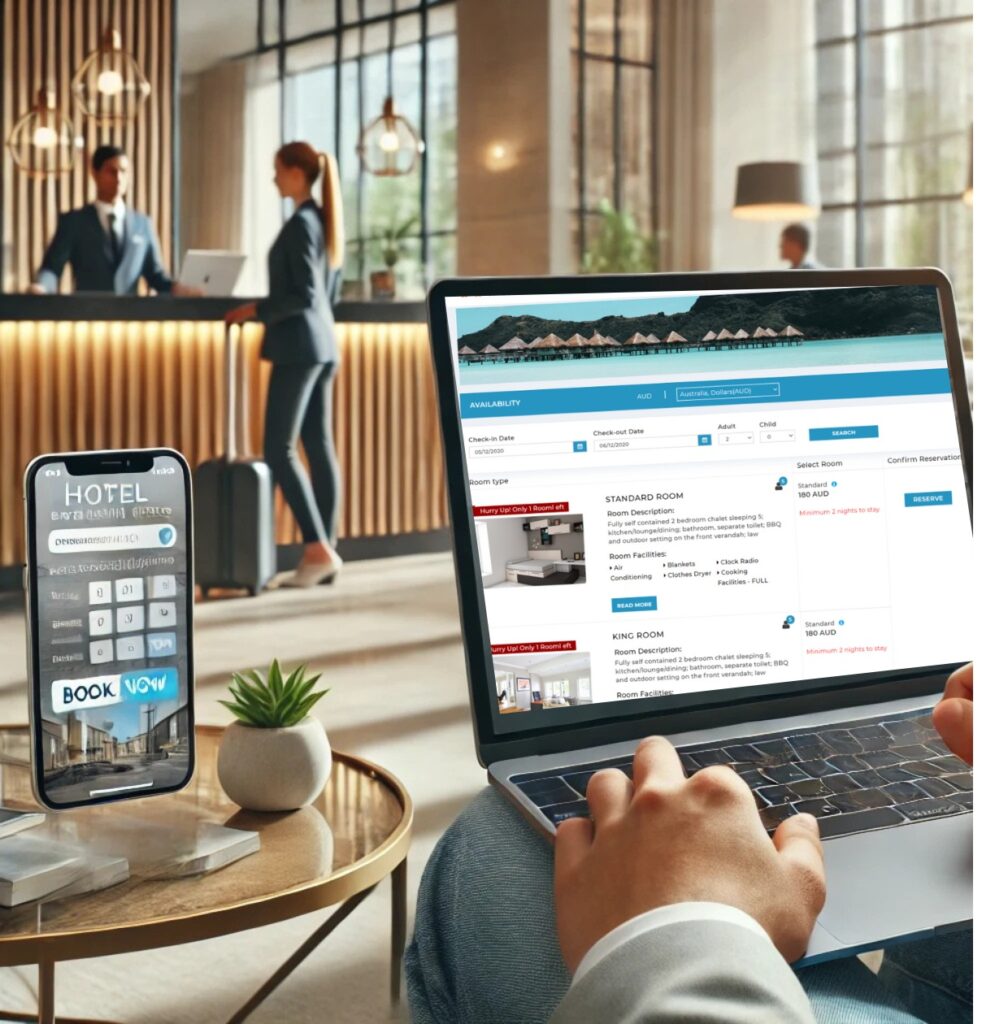What Are Direct Bookings?
Direct bookings occur when guests make reservations directly with a property rather than through online travel agencies (OTAs) or third-party intermediaries. These reservations are typically made via a hotel’s official website using Channel Managers Booking Engine, direct communication channels like email or phone, or through social media and messaging platforms like WhatsApp and Messenger.
The significance of direct bookings lies in their ability to establish a direct relationship between lodging businesses and guests. By bypassing third-party platforms, hotels can save on hefty OTA commissions and retain full control over guest data, which can be leveraged for personalised interactions, future marketing, and loyalty-building efforts.
Why Direct Bookings Matter
For independent hotels, increasing direct bookings is a critical aspect of a balanced distribution strategy. A strong direct booking approach helps reduce customer acquisition costs, improve occupancy rates, and boost overall profitability. Moreover, having direct communication with guests enhances brand loyalty and provides greater flexibility in tailoring the guest experience.
However, while direct bookings are advantageous, this doesn’t mean OTA bookings should be dismissed. Online travel agencies still play a role in a hotel’s revenue strategy by attracting guests who might not have discovered the property otherwise. The key is finding the right balance between OTA and direct bookings to maximize revenue.
Exploring the Booking Landscape
Before diving into strategies to boost direct bookings, it’s essential to understand the different booking channels available:
- Online Travel Agencies (OTAs): Platforms like Expedia, Airbnb, and Booking.com drive a significant portion of hotel bookings. While they offer global exposure, they come with commission fees ranging from 15% to 30% per booking.
- Metasearch Engines: Websites like TripAdvisor, Kayak, and Trivago allow travellers to compare prices across different booking platforms, including a hotel’s direct website. Unlike OTAs, metasearch engines operate on a cost-per-click (CPC) model.
- Hotel Website: The most valuable channel for direct bookings, where hoteliers can engage with guests without paying commission fees. However, maintaining an effective website requires an investment in a booking engine, digital marketing, and user experience optimization.
Strategies to Drive More Direct Bookings
Implementing a direct booking strategy requires a combination of technology, marketing, and guest engagement. Here are some proven tactics:
- Implement a Mobile-Friendly, Commission-Free Booking Engine
- Ensure a seamless, user-friendly booking experience with minimal steps.
- Enhance Your Website’s User Experience
- Use high-quality images and videos to showcase rooms and amenities.
- Display clear calls-to-action (CTAs) like “Book Now” on every page.
- Provide an FAQ section to address common guest concerns.
- Offer Competitive Rate Plans
- Introduce flexible, early-bird, or non-refundable rate plans to cater to different traveller’s preferences.
- Provide Add-Ons and Upsells During Booking
- Offer guests additional services like transportation, spa treatments, or exclusive dining experiences to enhance their stay.
- Invest in Digital Marketing
- Utilise metasearch advertising to capture high-intent travellers.
- Leverage search engine marketing (SEM) and retargeting campaigns.
- Optimise search engine rankings through SEO efforts.
- Engage potential guests via email marketing and social media campaigns.
- Improve Guest Communication
- Implement automated messaging tools such as Guest Notifications that are triggered by booking creation, before check, day of check in, and checkout.
- Provide multiple communication channels, including phone, email, and social media.
- Create a Sense of Urgency
- Use flash sales and limited-time discounts to encourage immediate bookings.
- Highlight exclusive direct booking perks such as free upgrades or flexible cancellations.
- Sell an Experience, Not Just a Room
- Differentiate your property by highlighting unique experiences such as adventure packages, wellness retreats, or cultural events.
- Leverage Loyalty Programs
- Encourage repeat bookings by offering special member-only discounts or rewards.
- Use email marketing to stay connected with past guests and promote exclusive deals.
- Harness the Power of Social Media
- Promote direct bookings through engaging content, targeted ads, and influencer partnerships.
- Encourage guests to share their experiences using branded hashtags.
- Participate in Travel Events and Trade Shows
- Network with industry professionals and travellers to increase brand awareness.
- Collaborate with local tourism boards and travel agencies.
- Personalise the Guest Experience
- Use guest data to offer tailored recommendations and exclusive offers.
- Recognise special occasions like birthdays or anniversaries with personalised messages or discounts.
- Manage Online Reputation Effectively
- Proactively collect and respond to guest reviews on OTA and review platforms.
- Use feedback to improve services and enhance the overall guest experience.
Achieving a Balanced Booking Strategy
While increasing direct bookings is crucial for profitability, it’s essential to maintain a balanced approach. Evaluate your customer acquisition costs across all booking channels and continuously optimize your marketing efforts to ensure a cost-effective distribution mix.
By implementing these strategies, hotels can reduce dependency on OTAs, enhance guest relationships, and ultimately drive higher revenue. The key lies in persistence and adaptability—small, consistent improvements will lead to long-term success in maximising direct bookings.



